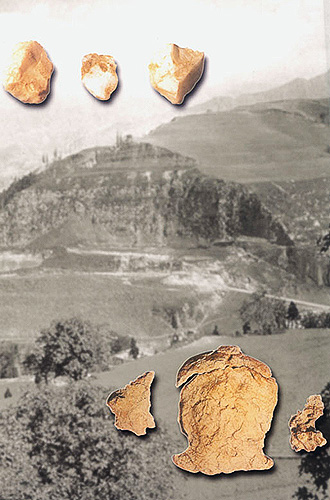| Art Q&A > Archeology |
|
|
Lantian Man in Shaanxi
Location of human fossils of the Early Paleolithic Age
Location: Lantian County, Shaanxi Province
Period: Chenjiawo Site is 650,000 BP, while Gongzhuling Site is 1,000,000 BP
Excavated in 1963
Significance: It has offered valuable material objects for the study of human evolution.
Lantian Man was found in two locations -- Gongwangling and Chenjiawo at Lantian in Shaanxi Province. Both fossils have been classified as female. The remains are believed to be about 600,000 years old, or as old as Java man, an early form of Homo erectus, and older than Peking Man, another form.
The Gongwangling fossils contained a skull, nasal bones, a right maxilla and three molars, all belonging to an adult, probably a female. The skull was low and flat with thick walls and a small brain volume of 780 ml, indicating its resemblance to the small-brained Java man. The frontal bone was slanted and the superciliary arches were strong. These characteristics plus the protruding mouth indicate a rather primitive human form. In Chenjiawo, a fossil of a mandible of an elderly woman was found. The human fossils in both locations have been dated to the Middle Pleistocene Epoch. Gongwangling Man lived about 800,000 - 750,000 years ago -- the oldest erect human fossil ever found in the north of Asia, while Chenjiawo Man lived about 530,000 years ago.
From the human fossil layer, numerous stone artifacts such as heavy points, choppers and scrapers were found. These objects were made using simple percussion, and during the age of Lantian Man, there were about forty-one types of wild animals. |
||||
All rights reserved. Reproduction of text for non-commercial purposes is permitted provided that both the source and author are acknowledged and a notifying email is sent to us. |
||||
 |
 Introduction
Introduction